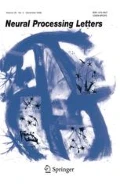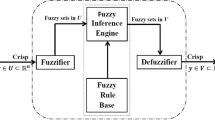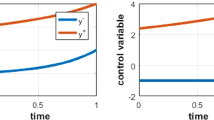Abstract
In this paper we present a new approach for solving a class of fractional optimal control problems based on generalized fuzzy hyperbolic model. The fractional derivatives are described in the Caputo–Fabrizio sense. In order to solve this problem, the necessary optimality conditions associated to the fractional optimal control problem is first derived. The solution of these conditions is then approximated by fuzzy solution based on generalized fuzzy hyperbolic model. A learning algorithm is used to achieve the adjustable parameters of the obtained fuzzy solution. In order to confirm the efficiency and accuracy of the proposed approach, some illustrative examples are implemented.








Similar content being viewed by others
References
Sun H, Zhang Y, Baleanu D, Chen W (2018) Chen Y A new collection of real world applications of fractional calculus in science and engineering. Commun Nonlinear Sci Numer Simulat 64:213–231
Pham VT, Vaidyanathan S, Volos C, Kapitaniak T (2018) Nonlinear dynamical systems with self-excited and hidden attractors. Springer, Berlin
Miller KS, Ross B (1993) An introduction to the fractional calculus and fractional differential equations. Wiley, New York
Riewe F (1996) Nonconservative Lagrangian and Hamiltonian mechanics. Phys Rev E 53(2):1890–1899
Riewe F (1997) Mechanics with fractional derivatives. Phys Rev E 55(3):3582–3592
Agrawal O (2004) A general formulation and solution scheme for fractional optimal control problems. Nonlinear Dyn 38:323–337
Bhrawy AH, Doha EH, Baleanu D, Ezz-Eldien SS, Abdelkawy MA (2015) An accurate numerical technique for solving fractional optimal control problems. Proc Roman Acad Ser A 16:47–54
Bhrawy AH, Ezz-Eldien SS (2016) A new Legendre operational technique for delay fractional optimal control problems. Calcolo 53:521–543
Bhrawy AH, Doha EH, Machado JA, Ezz-Eldien SS (2015) An efficient numerical scheme for solving multi-dimensional fractional optimal control problems with a quadratic performance index. Asian J Control 17(6):2389–2402
Zaky MA (2018) A Legendre collocation method for distributed-order fractional optimal control problems. Nonlinear Dyn 91(4):2667–2681
Keshavarz E, Ordokhani Y, Razzaghi M (2016) A numerical solution for fractional optimal control problems via Bernoulli polynomials. J Vib Control 22(18):1–15
Behroozifar M, Habibi N (2018) A numerical approach for solving a class of fractional optimal control problems via operational matrix Bernoulli polynomials. J Vib Control 24(12):2494–2511
Zaky MA, Tenreiro Machado JA (2017) On the formulation and numerical simulation of distributed-order fractional optimal control problems. Commun Nonlinear Sci Numer Simul 52:177–189
Heydari MH, Hooshmandasl MR, Maalek Ghaini FM, Cattani C (2016) Wavelets method for solving fractional optimal control problems. Appl Math Comput 286:139–154
Hosseinpour S, Nazemi AR (2016) Solving fractional optimal control problems with fixed or free final states by Haar wavelet collocation method. IMA J Math Control Inf 33(2):543–561
Almeida R, Torres D (2015) A discrete method to solve fractional optimal control problems. Nonlinear Dyn 80:1811–1816
Baleanu D, Jajarmi A, Hajipour M (2017) A new formulation of the fractional optimal control problems involving Mittag–Leffler nonsingular kernel. J Optim Theory Appl 157(3):718–737
Jajarmi A, Hajipour M, Mohammadzadeh E, Baleanu D (2018) A new approach for the nonlinear fractional optimal control problems with external persistent disturbances. J Frankl Inst 355:3938–3967
Agrawal OP, Defterli O, Baleanu D (2010) Fractional optimal control problems with several state and control variable. J Vib Control 16(3):1967–1976
Tohidi E, Saberi Nik H (2015) A Bessel collocation method for solving fractional optimal control problems. Appl Math Model 39(2):455–465
Bhrawy AH, Ezz-Eldien SS, Doha EH, Abdelkawy MA, Baleanu D (2017) Solving fractional optimal control problems within a Chebyshev–Legendre operational technique. Int J Control 90(6):1230–1244
Doha EH, Bhrawy AH, Baleanu D, Ezz-Eldien SS, Hafez RM (2015) An efficient numerical scheme based on the shifted orthonormal Jacobi polynomials for solving fractional optimal control problems. Adv Differ Equ 15:1–17
Dehghan M, Hamedi EA, Khosravian-Arab H (2016) A numerical scheme for the solution of a class of fractional variational and optimal control problems using the modified Jacobi polynomials. J Vib Control 22(6):1–13
Rabiei K, Ordokhani Y, Babolian E (2017) The Boubaker polynomials and their application to solve fractional optimal control problems. Nonlinear Dyn 88(2):1013–1026
Nemati A, Yousefi S, Soltanian F, Ardabili JS (2016) An efficient numerical solution of fractional optimal control problems by using the Ritz method and Bernstein operational matrix. Asian J Control 18(6):2272–2282
Rahimkhani P, Ordokhani Y, Babolian E (2016) An efficient approximate method for solving delay fractional optimal control problems. Nonlinear Dyn 86(3):1649–1661
Moradi L, Mohammadi F, Baleanu D (2019) A direct numerical solution of time-delay fractional optimal control problems by using Chelyshkov wavelets. J Vibr Control 25(2):1–15
Bello Salati A, Shamsi F, Torres D (2019) Direct transcription methods based on fractional integral approximation formulas for solving nonlinear fractional optimal control problems. Commun Nonlinear Sci Numer Simul 67:334–350
Sabermahani S, Ordokhani Y, Youse S (2019) Fractional-order Lagrange polynomials: an application for solving delay fractional optimal control problems.Trans Inst Meas Control 41:2997–3009
Peng L, Zhou Y, Debbouche A (2019) Approximation techniques of optimal control problems for fractional dynamic systems in separable Hilbert spaces. Chaos Solitons Fract 118:234–241
Hassani H, Tenreiro Machado JA, Naraghirad E (2019) Generalized shifted Chebyshev polynomials for fractional optimal control problems. Commun Nonlinear Sci Numer Simul 75:50–61
Lotfi A (2019) Epsilon penalty method combined with an extension of the Ritz method for solving a class of fractional optimal control problems with mixed inequality constraints. Appl Numer Math 135:497–509
Hosseinpour S, Nazemi AR, Tohidi E (2019) Muntz–Legendre spectral collocation method for solving delay fractional optimal control problems. J Comput Appl Math 351:344–363
Rooh UA, Li A, Ali MM (2015) Fuzzy, neural network and expert systems methodologies and applications: a review. J Mob Multimed 11(1):157–176
Yu X, Zhou Z, Gao Q, Li D, Ríha K (2018) Infrared image segmentation using growing immune field and clone threshold. Infrared Phys Technol 88:184–193
Yu X, Ye X, Gao Q (2019) Pipeline image segmentation algorithm and heat loss calculation based ongene-regulated apoptosis mechanism. Int J Press Vessels Pip 172:329–336
Duan L, Fang X, Huang C (2017) Global exponential convergence in a delayed almost periodic nicholsons blowflies model with discontinuous harvesting. Math Methods Appl Sci 41(5):1954–1965
Duan L, Huang L, Guo Z, Fang X (2017) Periodic attractor for reaction–diffusion high-order hopfield neural networks with time-varying delays. Comput Math Appl 73(2):233–245
Yang C, Huang L, Li F (2018) Exponential synchronization control of discontinuous nonautonomous networks and autonomous coupled networks. Complexity 2018:1–10
Huang C, Su R, Cao J, Xiao S (2020) Asymptotically stable of high-order neutral cellular neural networks with proportional delays and D operators. Math Comput Simul 171:127–135
Chen D, Zhang W, Cao J, Huang C (2020) Fixed time synchronization of delayed quaternion-valued memristor-based neural networks. Adv Differ Equ 2020:92
Ghasemi S, Nazemi AR, Hosseinpour S (2017) Nonlinear fractional optimal control problems with neural network and dynamic optimization schemes. Nonlinear Dyn 89(4):2669–2682
Kheyrinataj F, Nazemi AR (2020) Fractional power series neural network for solving delay fractional optimal control problems. Connect Sci 32:53–80
Yavari M, Nazemi AR (2019) An efficient numerical scheme for solving fractional infinite-horizon optimal control problems. ISA Trans 94:108–118
Ghasemi S, Nazemi AR (2018) A neural network method based on Mittag-Leffer function for solving a class of fractional optimal control problems. AUT J Model Simul 50:211–218
Kheyrinataj F, Nazemi AR (2020) Fractional Chebyshev functional link neural network-optimization method for solving delay fractional optimal control problems with Atangana-Baleanu derivative. Optim Control Appl Methods 41:808–832
Yavari M, Nazemi AR (2020) On fractional infinite-horizon optimal control problems with a combination of conformable and Caputo-Fabrizio fractional derivatives. ISA Trans 101:78–90
Boulkaibet I, Belarbi K, Bououden S, Marwala T, Chadli M (2017) A new T–S fuzzy model predictive control for nonlinear processes. Expert Syst Appl 88:132–151
Zhu Q, Azar AT (2015) Complex system modelling and control through intelligent soft computations. Springer, Berlin
Wu ZG, Dong SH, Shi P, Su H, Huang T, Lu R (2017) Fuzzy-model-based nonfragile guaranteed cost control of nonlinear Markov jump systems. IEEE Trans Syst Man Cybern Syst 47(8):1–10
Mirzajani S, PourmahmoodAghababa M, Heydari A (2019) Adaptive T–S fuzzy control design for fractional-order systems withparametric uncertainty and input constraint. Fuzzy Sets Syst 365(15):22–39
Zhang HG, Yongbing Q (2001) Modeling, identification, and control of a class of nonlinear systems. IEEE Trans Fuzzy Syst 9(2):349–354
Zhang HG, Wang Z, Liu D (2003) Chaotifying fuzzy hyperbolic model using adaptive inverse optimal control approach. Int J Bifurc Chaos 12:32–43
Takagi T, Sugeno M (1985) Fuzzy identification of systems and its applications to modeling and control. IEEE Trans Syst Man Cybern 15(1):116–132
Dang QV et al (2017) Robust stabilizing controller design for Takagi–Sugeno fuzzy descriptor systems under state constraints and actuator saturation. Fuzzy Sets Syst 329:77–90
Muthukumar P, Balasubramaniam P, Ratnavelu K (2016) T–S fuzzy predictive control for fractional order dynamical systems and its applications. Nonlinear Dyn 86(2):751–763
Dong J, Fu Y (2017) A design method for T–S fuzzy systems with partly immeasurable premise variables subject to actuator saturation. Neurocomputing 225:164–173
Shen H, Su L, Park JH (2017) Reliable mixed/passive control for T–S fuzzy delayed systems based on a semi-Markov jump model approach. Fuzzy Sets Syst 314:79–98
Chen YY, Chang YT, Chen BS (2009) Fuzzy solutions to partial differential equations: adaptive approach. IEEE Trans Fuzzy Syst 17(1):116–127
Zhou Ya, Wan Xiaoxiao, Huang Chuangxia, Yang Xinsong (2020) Finite-time stochastic synchronization of dynamic networks with nonlinear coupling strength via quantized intermittent control. Appl Math Comput 376:125157
Pakdaman M, Effati S (2016) Approximating the solution of optimal control problems by fuzzy systems. Neural Process Lett 43(3):667–686
Kosko B (1994) Fuzzy systems as universal approximators. IEEE Trans Comput 43(11):1329–1333
Buckley JJ (1992) Universal fuzzy controllers. Automatica 28:1245–1248
Wang LX (1992) Fuzzy systems are universal approximators. In: Proceedings of the IEEE international conference on fuzzy systems. San Diego, pp 1163–1170
Ying H (1994) Sufficient conditions on general fuzzy systems as function approximators. Automatica 30:521–525
Zeng XJ, Singh MG (1995) Approximation theory of fuzzy systems–MIMO case. IEEE Trans Fuzzy Syst 3(4):219–235
Kreinovich V, Nguyen HT, Yam Y (2000) Fuzzy systems are universal approximators for a smooth function and its derivatives. Int J Intell Syst 15(6):565–574
Zak SH (2003) Systems and control. Oxford University Press, Oxford
Zhang M, Zhang H (2006) Robust adaptive fuzzy control scheme for nonlinear system with uncertainty. J Control Theory Appl 4(2):209–216
Zhang HG, Wang ZL, Li M, Quan B, Zhang MJ (2004) Generalized fuzzy hyperbolic model: a universal approximator. Acta Autom Sin 30(3):416–422
Zhang JL, Zhang HG, Luo YH, Liang HJ (2013) Nearly optimal control scheme using adaptive dynamic programming based on generalized fuzzy hyperbolic model. Acta Autom Sin 39(2):142–148
Sun Q, Wang Q, Yang J, Qiu Y, Zhang H (2014) Chaotic dynamics in smart grid and suppression scheme via generalized fuzzy hyperbolic model. Math Probl Eng 2014:Article ID 761271
Cui Y, Zhang HG, Wang Y, Gao W (2016) Adaptive control for a class of uncertain strict-feedback nonlinear systems based on a generalized fuzzy hyperbolic model. Fuzzy Sets Syst 302:52–64
Zhang H, Liu D (2006) Fuzzy modeling and fuzzy control. Springer, Berlin
ZhangM, Zhang H and Liu D (2004) A generalized fuzzy hyperbolicmodeling and control scheme. IEEE Int Conf Fuzzy Syst 3:1203–1207
Zhang M, Zhang H (2005) Modeling and control based on generalized fuzzy hyperbolic model. In: American control conference (2005)
Mortezaee M, Ghovatmand M, Nazemi A (2020) Solving variable-order fractional differential algebraic equations via generalized fuzzy hyperbolic model with application in electric circuit modeling. Soft Comput. https://doi.org/10.1007/s00500-020-04969-7
Yepez-Martinez H, Gomez-Aguilar JF (2019) A new modified definition of Caputo–Fabrizio fractional-order derivative and their applications to the multi step homotopy analysis method. J Comput Appl Math 346:247–260
Yildiz TA, Jajarmi A, Yildiz B, Baleanu D (2019) New aspects of time fractional optimal control problems within operators with nonsingular kernel. Discrete Continu Dyn Syst 13:407–428
Bastos N (2018) Calculus of variations involving Caputo–Fabrizio fractional differentiation. Stat Optim Inf Comput 6:12–21
Caputo M, Fabrizio M (2015) A new definition of fractional derivative without singular kernel Progr. Fract Differ Appl 1(2):73–85
Atanacković TM, Pilipović S, Zorica D (2018) Properties of the Caputo–Fabrizio fractional derivative and its distributional settings. Fract Calc Appl Anal 21(1):29–44
Bazaraa MS, Sherali HD, Shetty CM (2006) Nonlinear programming—theory and algorithms, 3rd edn. Wiley, NJ, p 2006
Nocedal J, Wright S (2006) Numerical optimization, 2nd edn. Springer, NewYork
Lee KY, El-Sharkawi KY (2008) Modern heuristic optimization techniques: theory and applications to power systems. IEEE Press Series Power Eng
Mei W, Bullo W (2017) LaSalle invariance principle for discrete-time dynamical systems: a concise and self-contained tutorial. arXiv:1710.03710
Funding
This study was not funded by any grant.
Author information
Authors and Affiliations
Corresponding author
Ethics declarations
Conflict of interest
The authors declare that they have no conflict of interest.
Additional information
Publisher's Note
Springer Nature remains neutral with regard to jurisdictional claims in published maps and institutional affiliations.
Rights and permissions
About this article
Cite this article
Mortezaee, M., Ghovatmand, M. & Nazemi, A. An Application of Generalized Fuzzy Hyperbolic Model for Solving Fractional Optimal Control Problems with Caputo–Fabrizio Derivative. Neural Process Lett 52, 1997–2020 (2020). https://doi.org/10.1007/s11063-020-10334-4
Published:
Issue Date:
DOI: https://doi.org/10.1007/s11063-020-10334-4




